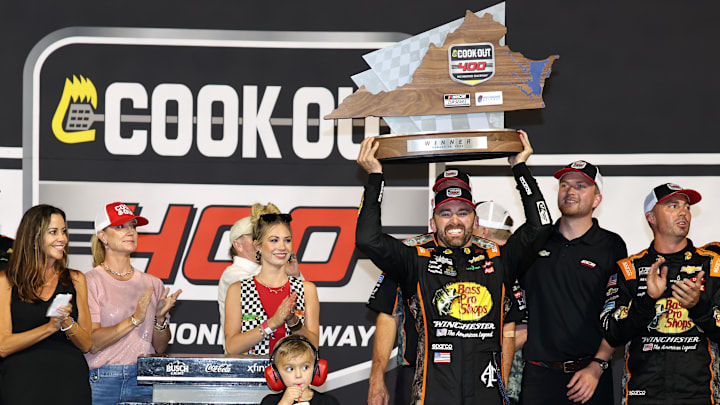It's no secret that NASCAR's playoff format is rather unpopular with the majority of fans. It was already set to be a topic of heavy discussion this week, as the 2025 regular season is set to conclude at Daytona International Speedway, and it will only generate that much more attention after the result of Saturday's Cook Out 400 at Richmond Raceway.
Austin Dillon won for the second year in a row, yet again from deep in the standings, only this time he'll get to keep his playoff spot. That means Chris Buescher, who is 11th in the full-season points, is knocked out unless he wins at Daytona. If he, or anybody else outside the current field, does, then Alex Bowman (ninth) or Tyler Reddick (seventh) could be in trouble.
It's not fair. Of course, NASCAR's playoffs were never designed to be fair. They were designed for entertainment purposes, to manufacture Game 7 moments throughout the fall.
As opposed to other sports, which...aren't?
NASCAR media personality Mamba Smith outright admitted this in an X post that predictably drew heavy criticism on Sunday. One is free to disagree with his position, but it does beg the question: how come playoffs are considered strictly a NASCAR problem?
The point isn’t to crown the best driver… It’s to crown the best team who executed the best when the pressure was at its highest and the lights were the brightest. https://t.co/EctxqbV2je
— Mamba Smith (@MambaSmith34) August 17, 2025
The concept, as Smith states, of rewarding "the team who executed the best when the pressure was at its highest", can apply to any sport. Yet in football, basketball, baseball, or hockey, it's not only accepted as the right way to crown a champion, but any suggestion to abolish the playoffs would be considered blasphemy. So, what gives?
Some will say the difference is that in those sports, each team doesn't play every other team every week. But the playoffs are still structured in the same fashion, where a dominant overall body of work can be erased by one bad outing at the wrong time.
NASCAR fans love to bring up the hypothetical of a driver winning each of the first 35 races in a season, then finishing second in the season finale and losing the title, something that will never happen in a million, billion, trillion years.
But it quite literally did happen in the NFL in 2007, when the New England Patriots won every game until the Super Bowl, where they lost to the New York Giants. It happened in college basketball in 2015, when the Kentucky Wildcats were 38-0 before losing in the Final Four to the Wisconsin Badgers.
In those instances, it was celebrated. Everybody wanted to see the underdog take down the big, bad bully. Now sure, in those sports, there are not enough games on the schedule for everyone to play everyone in the regular season.
But what about in the NBA? What about the NHL? They have 82-game seasons, and each team plays every other team at least twice before the playoffs. Then there's MLB with 162!
They still have playoffs, and not only does no one complain, but their playoffs are considered the only part of the season that matters. Sweeping judgments are made about teams based entirely on how they perform in five-game and seven-game sample sizes, no matter what they've done beforehand.
Players' legacies have been tarnished because they came up small in a few select moments. Coaches have lost their jobs because they were deemed "regular season coaches".
Is that fair?
Was it fair when the 73-9 Golden State Warriors lost the 2016 NBA Finals because of a few untimely injuries? Was it fair when the Tampa Bay Lightning tied the (then) all-time NHL record for regular season wins in 2019, and got eliminated in the first round? Maybe the average stick-and-ball fan thinks so.
After all, it's the only world they've ever known. And this is what brings up the real reason NASCAR's playoffs are so unpopular, the one nobody wants to admit to themselves.
It's because they have not traditionally existed. That's it. It's because unlike in other sports, there are memories of life before the playoffs, and everything looks better with those rose-tinted nostalgia goggles.
Now, to be clear, this is not necessarily a defense of NASCAR's playoffs, which are objectively flawed. The "win and in" aspect, for starters, needs to be revised. Dillon's victory locking him in is the equivalent of if a six-win NFL team making the playoffs just because they scored more points than any other team in the league on a random week.
No one outside the top 20 in the standings should be in the field, which frankly has too many spots regardless. Cut it from 16 down to 12, like it was before 2014.
The winner-take-all title race is also a problem. Either make it a multiple-race round like the first three rounds, or have it be two drivers instead of four, that way it's more likely that only the best of the best can get there. If eliminations must stay, then 16-8-4-2 (or better yet, 12-8-4-2) seems more ideal than 16-12-8-4.
But the bottom line is that NASCAR is no different from any other sport in that the best team all season doesn't always win. Its fans are just the only fans who are conditioned to think the best team always should win. And maybe they're right, in which case, let's keep that same energy across the board.
Playoffs are always about manufacturing entertainment. It's nothing new. It's only somewhat relatively new to NASCAR, and if it wasn't, then nobody would think twice about it.
